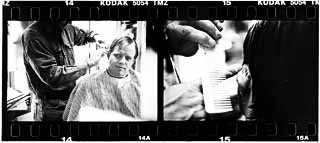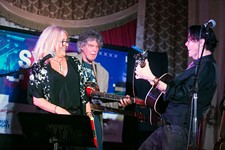Who's to Say
Pat Green's Controversial Brand of "Texas Music"
By Jim Caligiuri, Fri., Oct. 19, 2001

Pat Green is a lightning rod. The stocky, blond singer-songwriter, who currently calls Austin home, is the most successful country artist in Central Texas in a long, long time. So far, he's sold approximately 200,000 copies of five CDs he's released on his own label. During this run, Green's name has become synonymous with what's being referred to as "Texas Music" and regularly performs in front of thousands of rabid devotees throughout his home state. That said, there's no middle ground when one discusses Pat Green.
His music, his songwriting, his performances, and even his audience have drawn both severe criticism and extraordinary praise. His Universal Records debut, Three Days, came out Tuesday, and the video for the lead track, "Carry On," shot to No. 1 on Country Music Television in one week. Either Green is on the verge of something huge or he'll be just another flash in the pan whose music won't translate to audiences on the other side of the Red River.
Born in San Antonio and raised on a horse farm in Bosqueville, just outside of Waco, Green was the eighth of nine siblings. His father was a stage actor, and musically, at least initially, he was attracted to musicals like The Sound Of Music and My Fair Lady. He also claims that as a youth, he developed a taste for classical composers like Bach and Tchaikovsky. In high school, he discovered singer-songwriters, taking a shine to Robert Earl Keen and Jerry Jeff Walker. Green didn't learn to play guitar until his freshman year at Texas Tech.
"I can't say the motivation was completely musical and for personal growth," he explains with a chuckle. "I saw that guys with guitars had it a lot easier getting dates."
During his years in Lubbock, he began writing songs and playing small gigs wherever he could, sometimes just for free beer and barbecue. He got a bachelor's degree in general studies with the idea that he'd go on to a more specialized master's, but the music already had its hooks in him. He formed a small band and began touring around Texas. This writer recalls seeing him at La Zona Rosa in Austin in 1996, and being amazed at how much he sounded like Keen, both vocally and musically.
Not long afterward, Green became a regular on the dancehall circuit, selling out shows, selling out of CDs, and getting massive amounts of airplay on country radio stations around the state. In the process, he made enough money to buy his own bus, considered a luxury to anyone without major-label support. It also bought him the ability to progress at his own pace artistically, while opening shows for Walker, Keen, and even playing Willie Nelson's Fourth of July Picnic the past two times that it has been held.
Somewhere along the way, however, there was a critical backlash. Writers singled out Green's lack of originality in both performance and songwriting with a viciousness that's rare. Not that Green's audience paid any attention; the phenomenon just kept growing and growing. Recently, he drew nearly 40,000 people to a free show in Bedford, outside of Dallas.
Speaking of phenomena, there's also the one known as "Texas Music." Green, and to a lesser degree Cory Morrow, are the figureheads of this new wave, fancying themselves as following in the steps of Walker, Keen, Nelson, and Guy Clark. "Texas Music" has even become a radio format of sorts, with a weekly chart published out of Houston. Problem is, even though these artists continue multiplying their audience, in a critical sense, they're no Guy Clarks. There are just too many clichéd lyrics about Texas and drinking whiskey set to recycled country-rock riffs done better by someone else.
Keen, for one, has distanced himself from Green & Co. The man who penned the "The Road Goes on Forever" ("and the party never ends") recently referred to Green, Morrow, and their ilk as the "the devil's spawn" in the Houston Press. Calls to Keen's management to discuss this topic were not returned. Chicago singer-songwriter Robbie Fulks, for his part, entered the fray a short while ago by posting a screed against Green on his Web site after witnessing a Pat Green show in Nashville.
"The people who excel at that kind of entertainment, like Jimmy Buffett or Jerry Jeff Walker, were never popular with the press," says Fulks, who returned his call. "Their shows are just a party. I didn't think Green's show was the worst I ever saw, but his lyrics were kind of bad. After writing what I did, I got a letter that had a link to [Green's] Web site and a printout of his lyrics, which demonstrated to me that I hadn't gone far enough in bashing him.
"When I looked at his lyrics, I realized how juvenile they were. Those party kind of singers don't have a monopoly over lack of talent. Ryan Adams is a guy without an ounce of talent in my estimation. Pat Green is the Ryan Adams of party music."
Not everyone hates Green, however. Asleep at the Wheel's Ray Benson, for one, thinks Green's "phenomenal."

"I think he's a great performer," enthuses Benson. "The one thing I've noticed is that he's a charismatic guy onstage. He does a really great show. There's this real Texas chauvinism, and Pat defines it for his generation. I have my share of songs about Texas, but they're old songs. Pat just updates it and does it well."
Radney Foster, who duets with Green on his new album, chimes in on the side of Benson.
"I went to a couple of his shows and realized he's really a tremendous entertainer," says Foster. "He's also such a nice guy. The biggest thing that he has going for him is that he has this unbelievable connection with his audience. He's the same guy as the people in his audience, and that's a compliment in the best sort of way."
Local singer-songwriter Trish Murphy, who wrote "Wrong Side of Town," one of the songs on Green's new album, says she "was honored he chose to record one of my songs and I was thrilled that he asked me to sing it with him."
To his detractors, Green responds on "Who's to Say" from Three Days: "Who's to say, who are you to judge me anyway. This is my road and I'll take the corner as fast as I can go. Who's to say about how I got so lucky anyway."
In person, Green is just as direct.
"I don't appreciate the personal attacks, and I don't appreciate the attacks on the people that come to see me," he says. "The way I feel sometimes is that because I have crowds that come out and get rowdy, people say it's crap, it's not deep. My reaction is, 'Come on, this is what I love to do for a living. I don't come to your house and do that.'
"My faith in God is intact and sound, and I don't wear my religion on my sleeve. I wear my emotions on my sleeve. I do my performance for the people who come out. I have a connection with them, and it's a wonderful thing. As long as it's a fun thing for me to do to make a living and pay my bills and take care of my family and still be a human being, then I'm gonna do it."
At a recent show in Waco, not all the audience was connecting. In fact, many weren't even paying attention. There was a large crowd in front of the stage, all cowboy hats, baseball caps, and women in spaghetti strap tops when it was far too chilly for such a thing. They knew all the songs, were singing along at the top of their lungs, and chanting the now standard "Pat Fucking Green!" between tunes. Then there was the overwhelming majority, who were chatting away nonstop and making the quieter songs difficult to hear from the soundboard.
Live shows aside, it's a good bet that Three Days will garner Green backlash from his fans. Due to label pressure, half of the songs on the album, although new recordings, are from his prior releases. Nevertheless, Three Days demonstrates artistic growth for Green. His singing is more confident than it has previously been, his band is as tight as ever, and the recording, mostly produced by Lloyd Maines, sounds great. Unfortunately, Green's songs are the weakest of the batch. Even a duet with Willie Nelson, "Threadbare Gypsy Soul," suffers thanks to Green's forced wordplay.
Still, you have to respect Green for doing things his way. He decided to go with the New York-based Republic label -- home to another local grassroots phenomenon, Bob Schneider -- rather than a Nashville label.
"I felt that if I went with a Nashville label, I wouldn't be able to take part in writing songs that I wanted to sing," says Green. "I heard a lot about the song pitching process and as much as I appreciate the songwriters there, I wanted to do it myself or at least choose who I co-write with. There are good things and bad things about signing with a record label.
"Let's say I go out and sell 10,000 records. It used to be if I sold that much in a year, I could make a damn good living. Now, if I sell that many, I'm not going to see a dime. It's good and bad when you're forced to look at what you do as art and business. I think that's what people get hung up on when they're criticizing or evaluating people's lives and music and how they interact.
"I like being hands-on as much as I can. But I think there's a limit to how much you can do and be effective creatively. I'm pretty satisfied with the way we've done it. I'm the luckiest dude on the planet as far as I know." ![]()
Pat Green's CD release party is Saturday, Oct. 20, at Stubb's.








